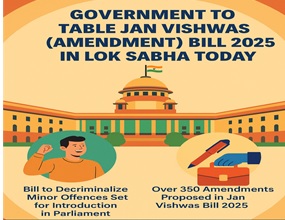09 February, 2026
Jan Vishwas (Amendment) Bill, 2025
Tue 19 Aug, 2025
Context:
- Union Minister Piyush Goyal introduced the Jan Vishwas (Amendment) Bill, 2025 in the Lok Sabha on 18 August 2025, which had already been approved by the Cabinet.
Key Points:
- This Bill is an important initiative of the Government of India aimed at improving Ease of Living and Ease of Doing Business, promoting trust-based governance, and decriminalizing minor offences.
- It is an extension of the Jan Vishwas (Amendment of Provisions) Act, 2023.
Background:
- The Jan Vishwas Bill was first introduced in 2022 and passed by Parliament in 2023.
- The 2023 Act decriminalized 183 provisions across 42 Central Acts from 19 Ministries, replacing imprisonment with penalties or administrative measures for minor offences.
Objectives of the 2025 Bill:
- Decriminalization of minor offences: Around 350 provisions are proposed to be decriminalized. For first-time violations, only a Corrective Notice will be issued instead of punishment.
- Trust-based governance: The government believes that citizens and businesses generally act in good faith, and small mistakes should not attract criminal liability.
- Ease of Living & Doing Business: The Bill seeks to reduce unnecessary legal burdens, improve the investment climate, and ease the load on courts.
- Viksit Bharat 2047 Vision: The Bill is aligned with the government’s vision of a developed India by 2047, focusing on citizen- and business-friendly governance.
Key Provisions:
Decriminalization:
- Over 350 provisions in various Central Acts will be amended.
- Minor infractions will be shifted from criminal offences to administrative penalties or corrective notices.
- Example: Earlier, minor mistakes could lead to imprisonment or heavy fines; now, only a notice or small penalty will be imposed.
- First-offence relief: First-time violators will not face punishment but will get an opportunity to rectify mistakes.
Acts Covered (Illustrative list):
- Drugs and Cosmetics Act, 1940
- Public Debt Act, 1944
- Pharmacy Act, 1948
- Cinematograph Act, 1952
- Copyright Act, 1957
- Patents Act, 1970
- Environment (Protection) Act, 1986
- Motor Vehicles Act, 1988
- Railways Act, 1989
- Information Technology Act, 2000
- Prevention of Money Laundering Act, 2002
- Food Safety and Standards Act, 2006
Features and Impacts:
Ease of Doing Business:
- Makes compliance easier for small traders and startups, simplifying business operations.
- Example: Licensing or registration errors will no longer attract harsh penalties but will be rectifiable with fines or notices.
Investment Climate:
- Reduced criminal liability and simpler compliance will boost investor confidence.
Citizen-Centric Governance:
- Protects common citizens from criminal proceedings for minor mistakes, reflecting the principle of “Minimum Government, Maximum Governance.”
Transparency & Accountability:
- Emphasis on transparent processes for issuing corrective notices and administrative fines, minimizing arbitrariness.
Comparison with Jan Vishwas Act, 2023:
2023 Act:
- Decriminalized 183 provisions across 42 Central Acts.
- Substituted imprisonment with penalties in many cases.
- Covered 19 Ministries and Departments.
2025 Amendment Bill:
- Broader in scope, targeting 350+ provisions.
- Introduces first-offence corrective notice provision.
- Stronger focus on small businesses, startups, and ease of living.
- Expands reforms introduced in 2023 with corrective measures.
Ministries and Process:
- Nodal Ministry: Ministry of Commerce & Industry, with involvement from Finance, Environment, Road Transport, Posts, and IT ministries.
Legislative Process:
- Introduced in Lok Sabha → may be referred to a Joint Parliamentary Committee or Standing Committee.
- After recommendations and amendments, it will move to Rajya Sabha for passage.
- A Parliamentary Committee had earlier suggested that States should also be encouraged to decriminalize minor offences.
Major Impacts and Benefits:
Economic Impact:
- Boost to investment, especially startups and MSMEs.
- Reduction in compliance costs and legal risks.
- Improvement in India’s Ease of Doing Business ranking globally.
Social Impact:
- Citizens relieved from jail terms for small mistakes.
- Strengthens public trust in government.
- Promotes a correction-oriented system instead of punitive governance.
Judicial Impact:
- Reduction in pendency of minor cases in courts.
- Faster resolution through administrative processes.


















